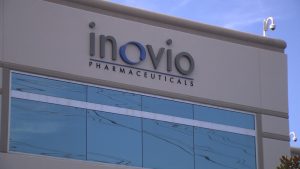In the COVID-19 containment race, Pennsylvania-based Inovio is betting it all on its new drug called INO-4800. It’s a long and arduous trek to the finish line, and most will fail to seize the coronavirus vaccine prize. Regardless, the biotech firm isn't backing down from the challenge. The firm began Phase 1 of its US clinical trial with 40 healthy people recruited from the University of Pennsylvania and the Center for Pharmaceutical Research in Kansas City, MO.
Inovio's approach is to strike while the proverbial iron is hot. As opposed to the tried and true method of developing specimens in a lab, it is attempting to grow pieces of the virus in the body. It's believed the body can learn to reject the virus without jeopardizing patient safety. If successful, this method offers a new, nimble solution for developing vaccines more quickly.
A timeline for the Inovio’s wonder drug depends on how the human trials go over the next months. As published in Nature Communications, the firm’s animal tests have yielded some promising results: “showing robust neutralizing antibody and T-cell immune responses against the coronavirus mice and guinea pigs.”
The biotech start-up's preclinical animal trials gave way to Phase 1 clinical trials - they began last month and will continue until the end of June. Provided that INO-4800 triggers a safe immune response in its human subjects, phases 2 and 3 will run over the summer months. A vaccine could be possible as early as the fall, which might prompt the Food & Drug Agency to issue Inovio emergency use authority for drugs.
Pharmaceutical stocks have risen and fallen in recent weeks as these companies' own drug successes and setbacks have played out on the nation's stage. As a frontrunner in the novel coronavirus vaccine competition, Inovio’s stocks have bounded up from a December 2019 price of $3.30 to $14.38 on May 21. It's a smaller biotech firm, and investors have tied much of the company's $2.3 billion valuation to the success of INO-4800.
There is a risk, however. If the vaccine fails, the start-up’s stock price could spiral dive with it. It's an unproven firm, and other concerns have come to the fore regarding its leadership team. Shareholders filed a class-action suit against the company's C-suite, alleging the executives are exaggerating the significance of their vaccine candidate. Key investors worry that the company's long-term value is likely to be affected by leadership's tendency to overpromise and under-deliver regarding INO-4800.
Additionally, analysts have observed that Inovio’s is going out on a limb with its choice to collaborate with Chinese agencies to test its potential vaccine. The deal with China could offer an immediate competitive gain for the company but end up being costly in the long term. If the vaccine trials in China are conducted with patients who have already been exposed to the virus or are not appropriately controlled with minimum ethical standards in mind, the tests will fail.
Overall, Inovio’s stock is buoyed by investor optimism about the company's vaccine candidate. Analysts remain skeptical, however, pointing to the company's lack of market-available products, its daunting debt-to-ratio equity, and confident claims about its vaccine.























